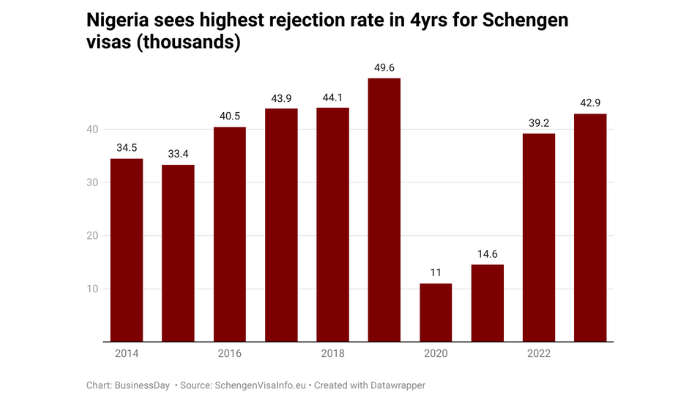Japa: Nigeria Records Highest Rejection Rate For Schengen Visas – Report

Following the implementation of stricter visa policies and increased scrutiny by the European Union, the number of Nigerians denied Schengen visa applications has reached its highest point in four years.
Data from an independent Europe-based platform for Schengen visa-related information, SchengenVisaInfo.eu, reported that Nigerian visa rejections rose by 9.97% in 2023, totalling 42,940 rejections compared to 39,189 in 2022.
The financial impact of these rejections has also grown, with the cost of denied visas escalating to €3.44 million in 2023 from €3.14 million the previous year.
The increase, according to Schengen.News was due to the more stringent visa policies and checks adopted by Schengen countries in response to migration and security concerns.
Furthermore, African nationals collectively spent €56.3 million on visa application fees in 2023, accounting for 43% of all such expenses globally.
READ: Russia Denies Forcing Nigerian Students Into Fighting For Visa Extensions
Rejection rates were particularly high for applicants from African and Asian countries, who together bear 90% of these costs.
Founder of LAGO Collective, Marta Foresti, commented on the situation, stating, “Visa inequality has very tangible consequences, and the world’s poorest pay the price. You can think of the costs of rejected visas as ‘reverse remittances’, money flowing from poor to rich countries. We never hear about these costs when discussing aid or migration; it is time to change that.”
The Schengen visa, the most common visa for Europe, permits travel within the Schengen Area for up to 90 days.
This area comprises 27 countries that have signed the Schengen Agreement, allowing for passport-free travel across their borders.
These countries include Austria, Belgium, the Czech Republic, Croatia, Denmark, Estonia, Finland, France, Germany, Greece, Hungary, Iceland, Italy, Latvia, Liechtenstein, Lithuania, Luxembourg, Malta, the Netherlands, Norway, Poland, Portugal, Slovakia, Slovenia, Spain, Sweden, and Switzerland.

Kazeem Badmus is a graduate of Mass Communication with years of experience. A professional in journalism and media writing, Kazeem prioritses accuracy and factual reportage of issues. He is also a dexterous finder of the truth with conscious delivery of unbiased and development oriented stories.









